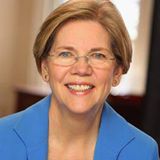The examples are everywhere these days. A Commerce Secretary who acts like a cartoon version of a Wall Street fat cat, awash in financial conflicts, intertwined with Russian financial interests, suspected of swindling millions from his business partners and using his official position to pump up his fortune through shady stock trading. An EPA Administrator who resigns in disgrace over corruption, only to be replaced with another EPA Administrator who belongs in the coal baron's hall of fame. A Congressman facing indictment for insider trading.
Let's face it: there's no real question that the Trump era has given us the most nakedly corrupt leadership this nation has seen in our lifetimes. But they are not the cause of the rot they're just the biggest, stinkiest example of it.
Corruption is a form of public cancer, and Washington's got it bad. It's time for treatment, time to isolate and quarantine the ability of big money to infect the decisions made every day by every branch of our government.
This problem is enormous but we've dealt with enormous problems before. We just need some big reform ideas and a willingness to fight for real change.
Ban elected and appointed officials from becoming lobbyists after they leave office. Not for one year. Not for two years. For the rest of their lives. Sorry, Billy. No more Congressman Pharma.
And no more pre-bribes like the Gary Cohn giveaway. No special deals for millions and millions of dollars to the policymakers who will be in a position to pay back their old employers.
We can also lock the revolving door for people who have led a company that got caught breaking the law or anyone who worked as a lobbyist for any corporation. A six-year time-out before that lobbyist or outlaw CEO can take a job in government. And we can limit the ability of America's biggest and most powerful companies to gain unfair market advantages from vacuuming up every former regulator on the market.
Sure, there's lots of expertise in the private sector, and government should be able to tap that expertise. And, yes, public servants should be able to use their expertise when they leave government. But we've gone way past expertise and are headed directly into graft. Padlock the revolving door.
Here's my Second Big Change: Stop self-dealing by public officials.If a person works for the government, then that work should serve the public. No making policy decisions to help yourself instead of taxpayers.
Right now, that problem begins with a President who may be vulnerable to financial blackmail from a hostile foreign power and God knows who else a President and his family who may be personally profiting off hundreds of policy decisions every day but we don't know, because he won't show us his tax returns and won't get rid of his personal business interests.
The truth is, it's insane that we have to beg the President of the United States to put the American people ahead of his own business interests. Insane.
Presidents should not be able to own companies on the side. And we shouldn't have to beg candidates to let the American people see their financial interests. That should be the law not just for presidential candidates, but for every candidate for every federal office.
While we're at it, enough of the spectacle of HHS Secretaries and herds of congressmen caught up in insider trading schemes. It's time to ban elected officials and senior agency officials from owning or trading any company stocks while in office. They can put their savings in conflict-free investments like mutual funds or they can pick a different line of work.
Third Big Change: End lobbying as we know it.The term "lobbying" has been around for nearly 200 years. And our Constitution protects "the right of the people" to petition the Government for a redress of grievances." But as recently as the 1970s there was no real corporate lobbying industry. There were lobbyists here and there, but there were not enough to fill a school bus.
Today, t he national Chamber of Commerce spends tens of millions of dollars to block policies that threaten the profits of a handful of America's richest corporations. They currently occupy an enormous building facing the White House, a sort of visual alternative to the government elected by the people. But back in the 1970s, the Chamber had no presence in DC to speak of. That started to change in 1972, when a hotshot corporate lawyer named Lewis Powell wrote a secret memo for the Chamber.
The Powell Memo declared that the free enterprise system was under assault and urged the Chamber to mobilize America's biggest businesses and establish themselves as a political force to be reckoned with.
Next Page 1 | 2 | 3 | 4 | 5 | 6 | 7
(Note: You can view every article as one long page if you sign up as an Advocate Member, or higher).





